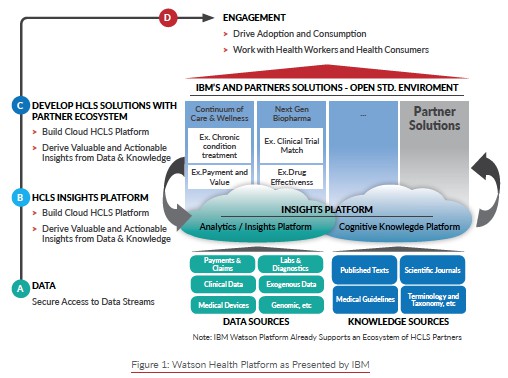IBM has been making a lot of noise as of late. First, it made a series of announcements at the HIMSS confab about its intentions to go deep into the healthcare vertical. Then last week it announced a partnership with Apple and Japan Post to provide Japan’s elderly population with an iPad enabled care platform. Clearly, IBM wants to make a mark in healthcare.
The question is, however, will it matter?
The healthcare industry has seen this play before, many times over. Big company with infinite resources makes claim that they will come in and solve many of healthcare’s ills. Big company goes on to state they are fully aware of the challenges, but they are in this for the long-term. Big company makes acquisitions, forms strategic partnerships, has big booth at HIMSS. Big company’s ambitions far exceed healthcare’s willingness to change. Investors get antsy, wanting results. Big company ultimately concedes defeat and exits.
IBM’s actions have the appearance that they will make a big play for the healthcare market. Leveraging their already copious analytic capabilities, IBM has further strengthened its healthcare hand acquiring both Explorys and Phytel. These two companies have leading mind-share (though not huge revenue streams) in the burgeoning healthcare analytics market and were profiled in our 2014 Analytics for Pop Health Report.
But when one looks more closely at all these announcements there is a distinct pattern – these announcements are not so much about building out an industry vertical as they are about a huge data grab.
Watson, Watson, Watson
Almost the day after IBM’s cognitive computing engine, Watson, won Jeopardy, IBM has been flogging the healthcare industry with all the great things Watson might be able to do in this sector. To date, IBM has had little to show for these efforts as frankly, Watson is a hard sell. Thus it was curious that for a brand that has gained little traction in healthcare, IBM would name its whole new healthcare division Watson Health.
Hope seemingly springs eternal at IBM for its Watson.
But this move also signals what IBM’s real intentions are.
Explorys and Phytel bring over 50M patient records to Watson, which as a learning system, can be used to further train its models. Medtronic and J&J partnerships likewise signal a data grab, this time biometric data from these companies’ devices. And the Japan Post partnership gives IBM access to a huge store of elderly patient data, which again just contributes to further train and strengthen Watson’s capabilities (see Figure 1).
In a recent post-HIMSS industry analyst call in which IBM was to delve into the details of what their intentions are in the healthcare sector, or at least that is what I assumed, the briefing was surprisingly devoid of anything substantive. Instead, just more of the same old, now getting tired song that Watson’s cognitive computing capabilities were going to do great things in healthcare.
Don’t get me wrong. I actually believe that the unique capabilities that Watson possesses has the potential to do some pretty incredible things in healthcare. It’s just time to move beyond the talk and get on with the execution and show us some real use cases that deliver at scale.
Deja vu or Something New
Getting back to the main question: Will IBM be in this for the long-haul?
One of the factors that has stumped many other big players entering the healthcare sector is this sector’s glacial pace of change. In many respects, healthcare has operated like an ancient guild hanging on to its traditions as seemingly every other part of the economy sheds them.
But that is also changing and at a fairly rapid pace. One macro vector is the move from volume-based reimbursement models to ones based on value. A second vector, and possibly larger, is the growing role of consumerism in healthcare. Third, of course, is the digitization of patient data which will provide new insights into what actually is providing demonstrable benefits to a patient. There are a multiple of other vectors as well, but these are arguably the largest.
These vectors are forcing the healthcare guild to shed those time-worn beliefs that are no longer relevant. It is forcing the healthcare sector to change and change quickly. That in turn will create opportunities for the likes of companies such as IBM, something that those who treaded down this path before them, were not afforded. It is now up to IBM to capitalize on that opportunity.
Addendum:
IBM isn’t done yet in forming partnerships to scoop up even more data. Today, IBM announced a partnership with Epic to use open standards to pull patient data out of Epic to feed Watson. IBM will work with Mayo Clinic as the first trial of such an approach. This could be potentially huge as Epic claims that roughly half of the US population has a health record stored in Epic. IBM also announced today that it is partnering with a dozen cancer research centers to further personalized medicine in the treatment of cancer.





IBM has made significant investments in healthcare technology. The strategic investments are moving them in the direction of personalized medicine. Early studies have demonstrated that data gleaned from electronic medical record can be used to predict clinical outcomes. By partnering with a firm like EPIC IBM is cementing its position as a leader in healthcare data products. This is a very important since many of the predictive algorithms used in systems like Watson become more accurate with greater amounts of data.
Wilhelm,
Indeed IBM has made some significant investments in healthcare, but how many of those have really been big successes? The acquisition of Initiate and IBM’s intention to become a major player in the HIE space amounted to nothing. Their acquisition of Curan has likewise not seen strong adoption. IBM still continues to push Watson on the healthcare sector, as well as other verticals, but has yet to really scale beyond some isolated pilots at a few prestigious AMCs and when you ask IBM about a packaged solution offering, you are usually met with response along the lines of: Well, what would you like a solution to do? What can we build for you? Few HCOs have the stomach or resources for an IBM custom built solution.
As to the partnership with Epic, IBM and Epic are submitting a joint bid for the massive $11B+ DoD EHR contract with Epic the software provider and IBM the SI. This partnership existed long before current announcement with Mayo.
That is not to say IBM does not have a wonderful opportunity and that recent moves by IBM are all about getting as much data as possible fed into Watson to “train the models” which could be invaluable for the healthcare industry going forward. But I will remain a somewhat cynical observer based on IBM’s past actions, until IBM clearly proves otherwise.
I’m more optimistic about the pace of change in health reform & innovation and the role IBM and its partners will play, and I posted an article by IBM’s Chief Health Officer, along with several related links, at http://www.mhealthtalk.com/ibm-watson-health-transforming-healthcare/.
I do, however, share your concern over the slow pace of tech adoption in healthcare and suggest watching this satirical video: http://www.mhealthtalk.com/if-air-travel-worked-like-health-care/.
Wayne, I do share in the belief that technologies such as Watson could be transformative to the delivery of care – what I am less sure about is IBM’s overarching healthcare strategy. It still is very much a work in progress and if the past is any guide to the future, IBM’s future in healthcare beyond, infrastructure and services, is still very much in question.